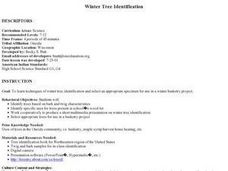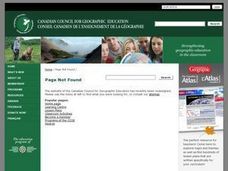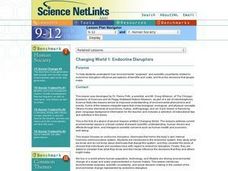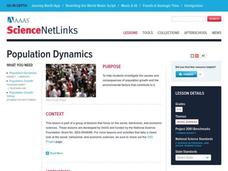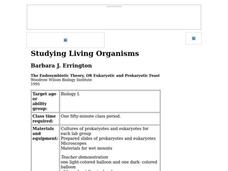Curated OER
Winter Tree Identification
Students utilize techniques of winter tree identification such as twig and bark characteristics. Students also identify specific uses for trees in school surrounding. They work cooperatively to produce a multimedia presentation on...
Curated OER
SPRING, BABY ANIMALS
Learners act out pictures of baby animals from magazines, label each picture correctly, compare and contrast ways of caring for baby animals today with historical ways of caring for baby animals.
Curated OER
The Great Energy Debate
Students explore the controversial issues surrounding the energy debate in Canada. They research recent initiatives being taken in this area and analyze their implication. Students then assume the roles of pivotal stakeholders in this...
Curated OER
Go Fish! Fish or other Sea Creature from Recycled Materials
Students brainstorm what a fish looks like determining the parts from schema and research. They create a unique and interesting 3-d sculpture of fish or underwater creature mostly from recycled materials, then examine the aesthetics of...
Curated OER
Crazy Hair
Young scholars decorate small styrofoam cups with faces and plant grass seeds in the cups in this Science and Art lesson for the early-elementary classroom. Emphasis is placed upon the science of seed growth. The lesson includes...
Alabama Learning Exchange
It's a Small, Small World
Students compare and contrast the different characteristics of animal-like, plant-like, and fungus-like protists. They list examples and describe the characteristics shared by the three protist groups. They create a brochure or slideshow...
Curated OER
Physicists or Philosophers?
Trace the sequential process of the developing theories of atomic structure in the early 20th century, show, in historical development, how scientists "know" things, how experiments are set up and how interpretations are drawn from them,...
Curated OER
Desert Animals
First graders investigate and identify a variety of animals that live in the desert. They complete a class KWL chart, then listen to the book Way Out in the Desert. Next, 1st graders observe a presentation of live desert animals, and...
Curated OER
Desert Biome
Students examine the vocabulary of desert animals and observe pictures of the animals as they name them. As a class, students compare and contrast the characteristics of desert animals. Using a specified website, students match...
Curated OER
Continents and Oceans
Students identify oceans and continents and their locations on a map. They color-code and label their own map of the world's continents and oceans. They play the game Continents and Oceans to identify specific areas.
Curated OER
Science NetLinks: Changing World 1: Endocrine Disruptors
High schoolers investigate how environmental surprises and endocrine disruptors influence perceptions of benefits and costs. The decisions of science are under these type of influences and must be thought out with a definite method.
Curated OER
Population Dynamics
High schoolers investigate the causes and consequences of population growth and the envrionmental factors that contribute to it. They discuss what they think the world's population will be in 2050.
Curated OER
A Look At Sunspots
Students research how the development of new technology has increased our knowledge of how the sun works. This lesson is part of a three-part series aimed at showing students how our knowledge of the universe must be inferred through the...
Curated OER
Get Smart
Students discuss the definition of intelligence and the possibility of measuring intelligence. They consider the elements of intelligence by reading and discussing the article "'Jeopardy' Millionaire is Smart, but Is He a Genius?They...
Curated OER
Extinction Is Forever
Students observe models of two kinds of forests with low and high biodiversity. They observe and record the effects of habitat destruction or extinction rates. They also conduct research about mass extinction like that of the ancient...
Curated OER
Biomes and Regions of the United States
Students examine and identify the characteristics of the biomes of the world. Using the Internet, they compare and contrast the similarities and differences and discover how living things are supported in the biomes. They discuss how the...
Curated OER
Investigating the Biosphere With Planetary Models
Learners create a biosphere using the computer program SImEarth. They work in small groups to create "Daisyworld" in which they model aspects of the Gaia hypothesis. They form a question to answer and choose variables to investigate in...
Curated OER
Amazon Adventure: a Case Study in Medical Technology And Bioethics
Students test problem-solving skills, the ability to see connections, and the ability to draw conclusions and inferences from information provided in a case study. Given a case study, they formulate a procedure and draw conclusions.
Curated OER
Studying Living Organisms
Students are introduced to Hardy-Weinberg Equilibrium without recourse to algebra. After participating in this activity, students gain a feeling for the significance of the Hardy-Weinberg Equilibrium without using algebra.
Curated OER
Life Cycle of the Drosophila Fly
High schoolers observe the life cycle of the Drosophila fly as well as manipulate large numbers of flies, determine the difference between the sexes, and identify the different stages of the fly's life cycle.
Curated OER
Demonstrating an Epidemic
Young scholars use an experiment that allows them to experience a small scale "epidemic", demonstrating the ease with which disease organisms are spread. Students determine the originator of the epidemic. They transfer live bacteria by...
Curated OER
Amazon Adventure: A Case Study in Medical Technology and Bioethics
Students explore a case study. They use problem solving skills to determine initial procedures or experiments necessary slow disease and develop a drug. Students examine FDA drug approval procedures. They consider environmental and...
Curated OER
Using A Winogradsky Column to Analyze Microbial Communities
Students use easily obtained materials to study ecological succession in a microbiological community. This investigation is appropriate for a variety of age groups. Elementary Students be fascinated by the changes occurring over time...
Curated OER
The Global Impact of Insect Borne Diseases & Agriculture
Students study the global impact of insect borne diseases, the appropriate use of pesticides, and the concept of human interrelations on a world wide scale. They examine how to safely apply a pesticide, according to the label.


